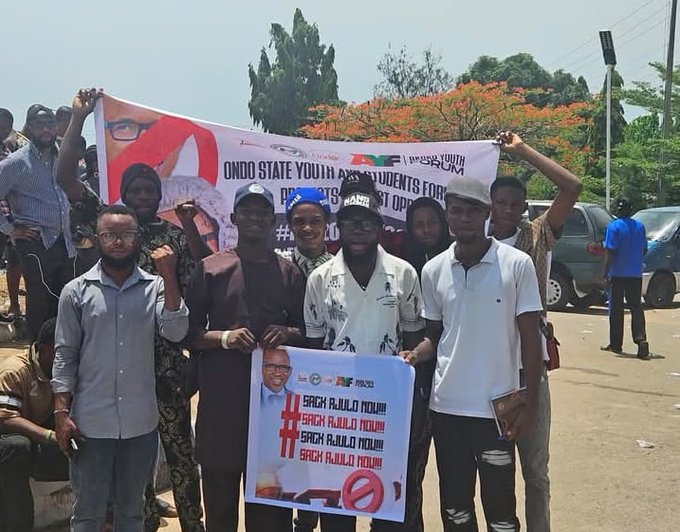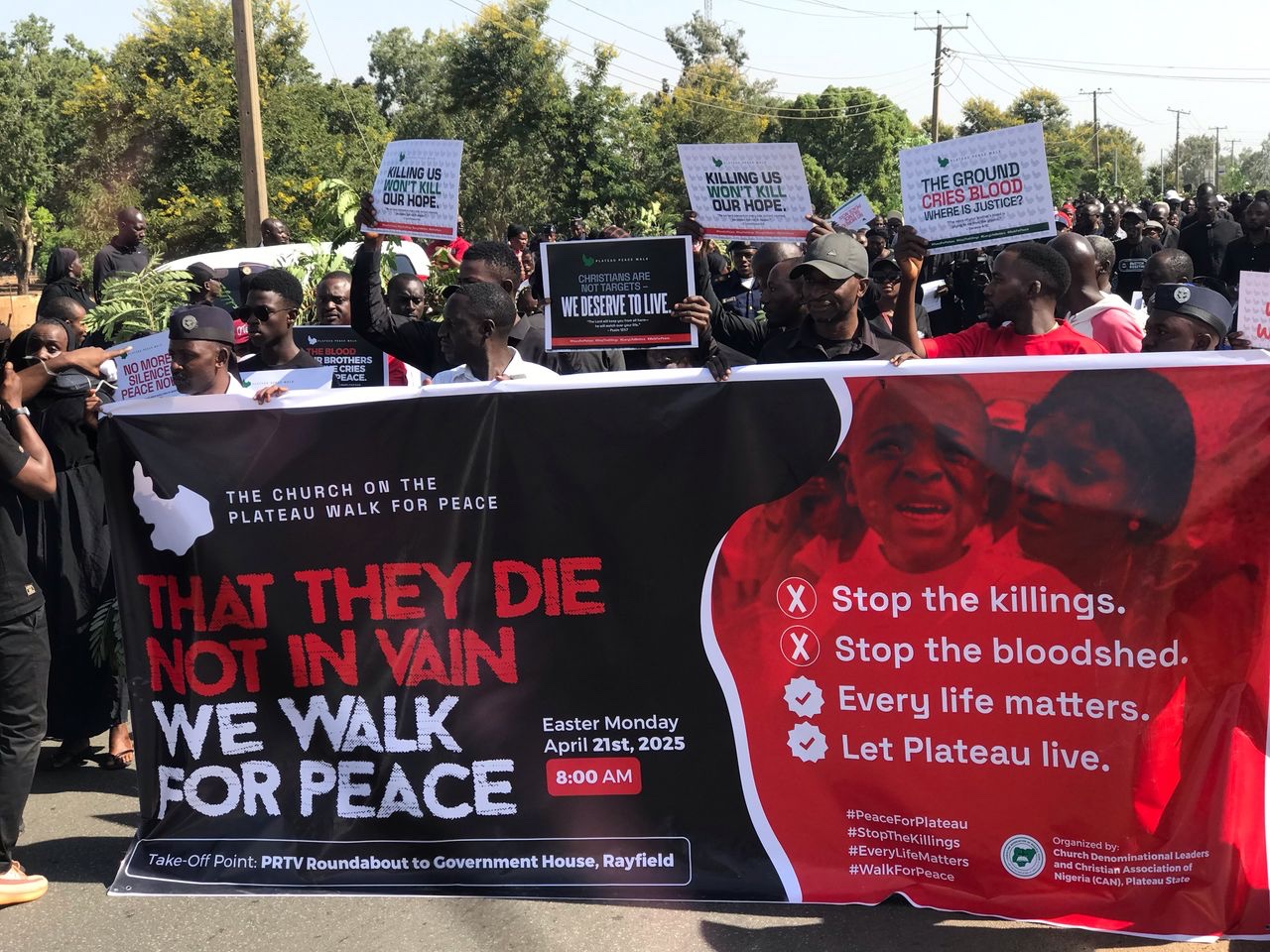
Protest Rocks Akure Over Arrest of Former Polytechnic SUG Leader

A large-scale protest erupted in Akure, the capital of Ondo State, following the arrest of the former Students’ Union Government (SUG) leader of the Ondo State Polytechnic, Owo. The incident has sparked outrage among students, alumni, and concerned citizens, leading to a series of demonstrations that brought traffic to a standstill and caused significant unrest across the city.
The protests, which began early in the morning, saw a large crowd of students, many of whom were current and former members of the SUG, marching through the streets in defiance of what they considered an unjust arrest of their former leader. Chanting slogans and waving banners, the protesters made it clear that they would not stand by silently as they felt the rights of their representative were being violated.
At the center of the protest was the arrest of the former SUG president, who, according to several reports, was apprehended by officers of the Nigerian Police Force on what students and witnesses described as unclear charges. While the police have yet to officially disclose the exact reasons for the arrest, sources suggest that it was linked to allegations of inciting violence and disrupting public order, though these claims remain largely unsubstantiated by clear evidence.
The arrest has raised questions about the role of student leaders in the broader socio-political landscape of Nigeria, with many protesters believing that the action was politically motivated. Former student leaders have long been a powerful voice for change in Nigeria, and many believe that the arrest is part of a broader effort to silence critics of the government. The arrest of a prominent student leader like the former SUG president, many argue, represents a dangerous move that threatens the right to free expression and the ability of students to organize for the advancement of their rights.
Local media reports indicate that the protests began in the early hours of the morning, when news of the arrest spread like wildfire across social media platforms and student groups. The initial gathering of students outside the Ondo State Polytechnic quickly escalated as hundreds more students, as well as concerned members of the public, joined in solidarity. What began as a small protest soon turned into a full-blown demonstration, with protesters blocking major roads in Akure and disrupting the flow of traffic.
According to eyewitnesses, the protestors were mostly peaceful, but tensions quickly rose as security forces began to mobilize in response to the growing crowd. The Nigerian police, along with other security agencies, were deployed in large numbers to the scene in an attempt to control the situation. The police reportedly used tear gas and fired warning shots into the air in a bid to disperse the protesters, though the crowd refused to back down, vowing to remain on the streets until their demands were met.
As the protest grew in size, so did the chorus of voices calling for the immediate release of the former SUG leader. Many students argued that the arrest was unjust and an infringement on the fundamental rights of the accused. Among the protesters were several former student leaders from other universities across Nigeria, who expressed concern over what they saw as a concerning trend of suppression against student activism in the country.
One of the students who participated in the protest, a former member of the Ondo State Polytechnic SUG, voiced his frustration at the situation. “This is not just about one person, it’s about all of us,” he said, holding up a placard that read, “Free Our Leader.” “They want to silence our voices, but we won’t let them. We will continue to fight for justice, and we will not rest until our leader is free.”
There were also reports that some alumni of the Polytechnic had joined the protests, expressing their anger over what they felt was an attack on the legacy of the institution’s leadership. They pointed to the role that the SUG and its leaders had played in advocating for students' rights in the past, and saw the arrest as a direct assault on the autonomy and integrity of student leadership in Nigeria.
The protest also drew attention to the broader issue of police brutality and the treatment of youth in Nigeria. In recent years, the country has witnessed widespread protests against police brutality, particularly in relation to the now-disbanded Special Anti-Robbery Squad (SARS). While the protests over the arrest of the former SUG leader are not specifically about police brutality, many participants drew parallels to the ongoing struggles against police abuse of power, particularly with the heavy-handed tactics employed by security forces to quell dissent.
Public opinion on the protests was mixed. While many sympathized with the students’ cause and expressed support for their right to peacefully protest, others voiced concerns about the potential for the situation to escalate further. In the aftermath of the protest, some residents of Akure expressed frustration over the disruption to daily life, including the closure of shops, schools, and businesses in the affected areas.
Despite these challenges, student leaders have vowed to keep up the pressure on authorities until the former SUG president is released. “We will not rest until justice is served,” one of the leaders said during a press conference. “We will continue to organize, we will continue to speak out, and we will not allow them to trample on our rights.”
This incident has brought to light not only the growing discontent among Nigerian students but also the role that student activism plays in the country’s political discourse. Students have historically been at the forefront of protests for political change in Nigeria, from the anti-colonial struggles of the 1960s to the pro-democracy movements of the 1990s. The recent protest in Akure is a reminder of the significant power that student unions and their leaders still hold in the fight for justice and equality in the country.
As of now, there is still no official word on when the former SUG president will be released, but students remain determined to continue their fight for justice. With the support of alumni, activists, and the general public, it is clear that the protest in Akure is far from over.
The fate of the former SUG leader hangs in the balance, but one thing is certain: the students of Ondo State Polytechnic and their counterparts across the country will not stop fighting for what they believe is right. The arrest may have sparked a storm of protest, but it has also ignited a renewed sense of unity and purpose among Nigerian students, many of whom are now more determined than ever to make their voices heard.
This ongoing protest in Akure serves as a powerful reminder of the resilience of Nigerian students in the face of adversity and their unyielding determination to stand up for their rights and the rights of their leaders. How the authorities choose to handle the situation will undoubtedly set the tone for future student activism in Nigeria, and it remains to be seen whether this protest will mark a turning point in the ongoing struggle for justice and freedom of expression in the country.


